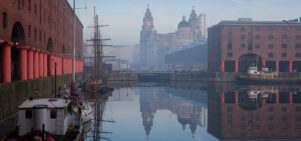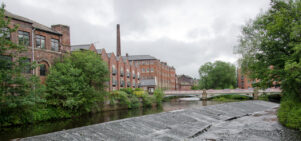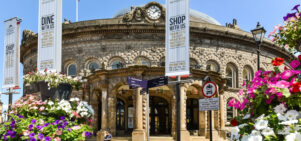Straight outta Brompton: the British-made folding bike is coming to a dock near you
Susie StubbsBrompton Bicycle’s chief exec tells us why people in cities are mad, and how his bike can cure all urban ills (well, almost).
A Brompton bike is a thing of beauty. A feat of British engineering, it inspires slavish devotion among its users. Will Self once mused on “the brilliance of the Brompton’s design”; self-avowed petrolhead James May says his Brompton folder is “the best bicycle in the world”. But celebrity fans aside, what makes the bike with such tiny wheels so remarkable is the fact that each is handmade. Well, that and the fact that you can try one out for practically nowt in Manchester this autumn.
The Brompton is one of Britain’s most successful exports, with the company selling 80% of those it makes to riders in countries such as Japan, South Korea and Scandinavia. But the Brommie began life in the humble surrounds of Andrew Ritchie’s flat; the engineer’s design for the revolutionary fold-up bike was named after the Brompton Oratory, the Catholic church he could see from his window. This kitchen table beginning was followed by years of frustration. While Ritchie came up with the design in 1975, he failed to find a manufacturer. Raleigh knocked him back, and it wasn’t until the mid-1980s that the bicycle went into full-time production. Even then, things were tricky. Ritchie’s design was so unusual that when its frame manufacturer pulled out, Brompton was left with a manufacturing gap that it struggled to fill.
We only outsource the non-clever stuff; the bits we lavish attention on are the things that are unique
And therein lies a handmade tale. Because there were few existing parts that worked with Ritchie’s design, he was forced to make them himself. Today, around three-quarters of the 1,200 components required for each bike are made by Brompton, via machines that are also designed and made by – you guessed it – Brompton. The whole process is incredibly labour intensive (the bikes are brazed rather than welded, for example, a process that makes for a stronger, lighter frame but which has to be done by hand), though that doesn’t appear to faze Brompton’s CEO, Will Butler-Adams. “Saying that they’re handmade is a bit of a misnomer – what isn’t?” he says. “But what you could say is that there are skills within the making of our bikes that are very different.” Handmade or not, the bicycle’s manufacture is kept largely in-house. “We only outsource the non-clever stuff,” says Butler-Adams. “The bits we lavish attention on are the things that are unique to the product, but it just happens that the product is unique all over. When you outsource, you don’t just outsource a job. You need to teach that person how to make it. You need to give them the right tools. You give away an awful lot, and that would be dangerous.”
“Ironically, by being in London we get very little seepage of our intellectual property. There are no other fruitcakes making bikes in London; our staff aren’t going to go trotting down the road to our competitor.” Judging by Butler-Adams’ affection for his staff, it is unlikely that they’d end up elsewhere anyway; every part of the bike can be traced back to the person who made it and this, Butler-Adams believes, creates something else that is also unusual: pride. “Each operator is proud of their work, and competitive too: everyone likes to show that they’ve done a good job.” And if one member of staff doesn’t do quite as well as they should? “They kick each other’s arses.”
That pride, the “compactness and complexity” of Andrew Ritchie’s design and the resulting process required to make them explains all you need to know about the Brompton. It also explains the price – basic models come in at around £745 – and why so many riders become so evangelical about their folder. In fact, trawling reviews and cycle forums throws up surprisingly few haters, those that do focusing on price, wheel size (Brompton’s come in at sixteen inches; competitor Dahons at twenty) and problematic punctures.
The majority of people living in cities are completely barking mad
Though the design has been honed over the years, today’s bike is essentially the same as that first made in the 1980s: those weeny wheels, a full-sized frame, an easy and efficient fold. It is these qualities that make the Brompton suited to urban life, according to Butler-Adams. “The majority of people living in cities are completely barking mad: they squeeze onto a train to get to work, their nose in someone’s armpit, or they sit in their car for 35 minutes when they could be at work in ten.
“The Brompton is by no means perfect but it makes getting around a city easy: you can stick it under your desk, you can take it to the pub and if you get a puncture or it’s pissing with rain, you can sling it in the back of a cab,” says Butler-Adams. The company took this idea a step further in 2011 with the creation of the Brompton Dock, a solar-powered, smartphone-operated hire scheme that’s spreading across the country. Manchester’s Piccadilly Station hub opened in 2012, and you can dot about on your own folder for as little as £2.50 a day (once you’ve paid an annual membership fee). It’s an idea partly inspired by the Boris Bike, though Butler-Adams reckons his scheme is cheaper and more flexible.
Don’t take Butler-Adams’ word for it. If you feel a healthy skepticism over the folder’s usefulness, we’ll leave the last word with two of its more ardent fans. The first is Todd Fahrner, an American who rode 700 miles along the Pacific coast, from Portland, Oregon almost all the way to San Franscisco – on a Brompton. He dodged black boars and feral dogs, cycled along unmarked roads, and slung it in the back of willing pick-ups when the going got tough. “I spent the best two weeks of my life riding my trusty Brompton folding bike,” he said, writing about his epic trip. “The fact is, Bromptons are amazingly versatile, appealing to hardened bike geeks like me, as well as to… well, all kinds of people.” The second is Will Self, who has long documented his love of the West London cycle and in 2008 described a journey where he used it to get between a succession of readings and gigs in London, Cambridge, Swansea and back to London. “What I’m trying to tell you,” he said about the route, “is sod the gigs – the biking was great.” As we (or actually, he) noted earlier: such is the brilliance of the Brompton’s design.


















